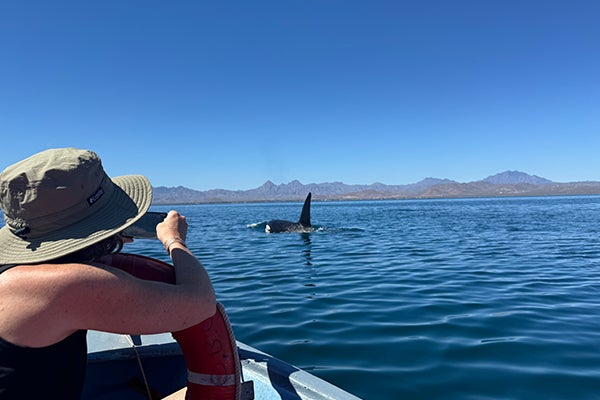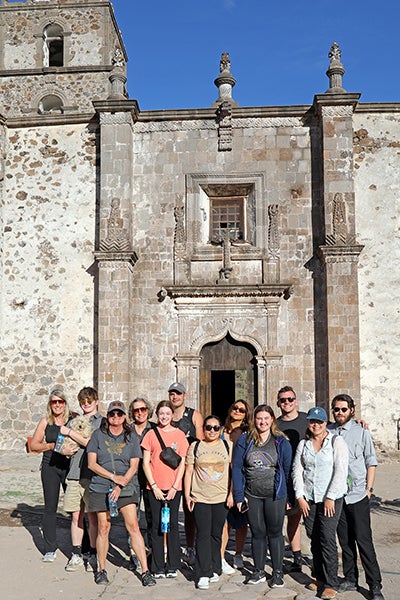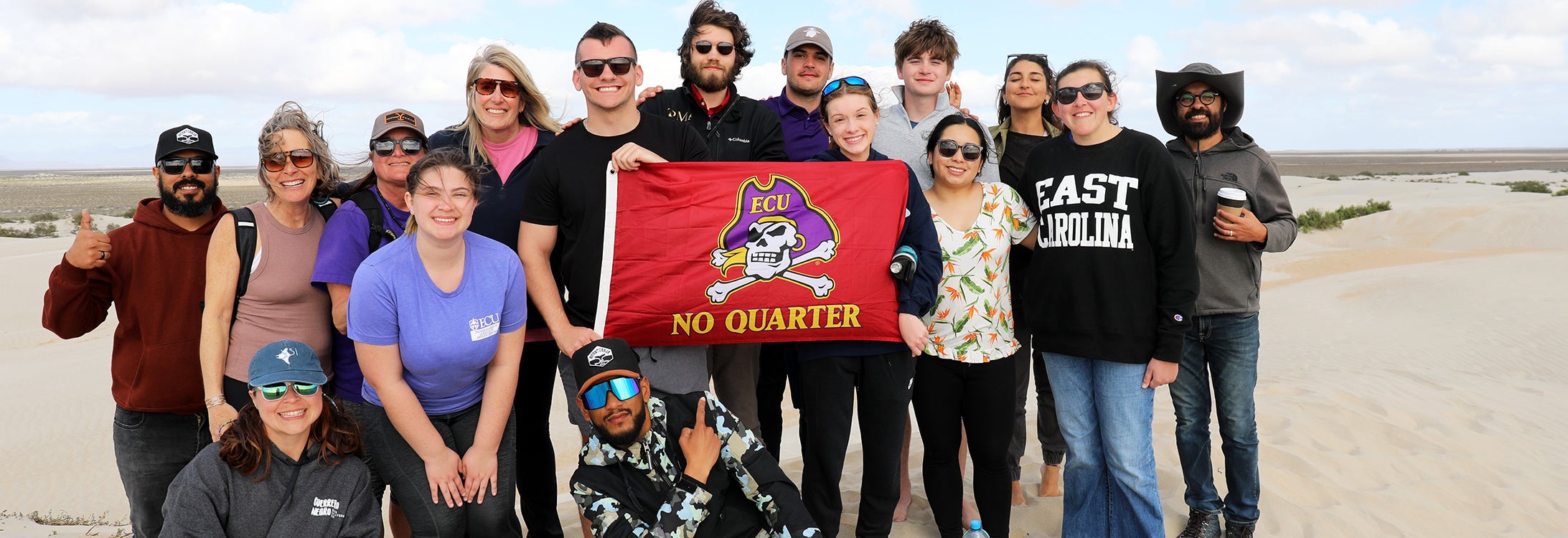Whale Watching
ECU students spend spring break studying abroad in Mexico
When people hear spring break in Mexico, they may think all-inclusive resorts and spending hours laying on a beach. For eight East Carolina University students, spring break in Mexico meant watching whales and immersing themselves in nature during a study abroad trip to Loreto and Guerrero Negro, Baja California Sur.
This trip was part of an Honors College seminar class led by College of Education science education faculty Dr. Tammy Lee and Bonnie Glass that uses systems science and ocean literacy to help students explore how climate change is facing marine ecosystems in North Carolina and the Baja peninsula in Mexico. One of the biggest draws of the trip was to observe the gray whales, a species of whales that complete an approximately 12,000-mile round-trip migration between the Arctic and Baja.
“We had repeatedly been told to manage our expectations in the weeks leading up to the trip because whales, like any other component of nature, are unpredictable,” said Madison Hruska, an honors student and management information systems major. “Keeping this in mind, I expected to see a few gray whales, but I never imagined we would see as many as we did. We saw five different species of whales while in Loreto and more than 30 individual gray whales in Guerrero Negro.”
The first part of the trip was spent in Loreto, a city located on the Gulf of California, and the gateway to access Loreto Bay National Park, an area that has been described as “The Aquarium of the World,” by Jacques Costeau. In addition to the different species of whales, students were able to study dolphins, orcas, sea lions and mobula rays.
While on land, students immersed themselves into the city’s culture, including visiting several prominent missions in the area and learning more about the history of how Loreto and surrounding areas were founded. The trip’s itinerary was compiled by Born to Baja, an ecotourism agency owned by brothers Rafael and Alejandro Galván.

During the trip, students and faculty were able to see a variety of marine wildlife, including orcas, whales, dolphins, sea lions and more.

Students visited several culturally significant areas of Mexico, such as the San Javier Mission, one of the best-preserved missions in Baja.
“I feel that our guides on this trip took on a similar role of a lot of host families that are found on many other study abroad trips offered by ECU,” said Braden McPhillips, a Brinkley-Lane Scholar and finance, management and accounting triple major. “Our guides were with us for the whole week, staying at every hotel with us, and eating every meal with us. By having them show us around instead of having to explore Baja on our own, we were able to see Mexico from their eyes and get firsthand accounts of how the cultural makeup of Mexico differs from the culture and way of life that we are used to in the United States.”
Experiencing a totally different environment is one of the reasons that Glass and Lee encourage students to participate in study abroad and place-based experiences. While students in this course will be completing assignments around advocacy and how climate change is affecting the migratory journey of gray whales in the Pacific and right whales along North Carolina, one of the most important aspects of these trips is the informal parts of the trip and the memories created.
“Out of all of the experiences that we’ve had, I would say all of our students have stayed connected with our guides,” Lee said. “Once you’ve touched a gray whale with someone or walked through a rainforest together or snorkeled a coral reef, you have this shared experience that no one else has but your group.”
When reflecting on the trip, many of the students noted that this trip had a profound impact on them.
“When you’re in the moment, you take it for granted because you’re so hopped up on the adrenaline, but those quiet moments afterwards where you get to reflect on what’s going on and what happened are something you can’t replicate,” said Maelee Becton, a multidisciplinary studies and psychology major and Brinkley-Lane Scholar.
Cultivating partnerships — like with Born to Baja — is what makes experiential learning opportunities like this trip possible, according to Lee and Glass. Lee went on an educational trip to Belize with Liz Baird, who managed educational programming at the North Carolina Museum of Natural Sciences in Raleigh. Through her more recent role with the North Carolina Aquariums, Baird connected Lee with Gail Lemiec, an educator at the N.C. Aquarium in Fort Fisher.
“Working through these informal science places that we have in North Carolina, like the museum, aquariums and nature centers, are how we make connections with naturalists and conservationists on our trips,” Lee said.
As science educators, Lee and Glass are passionate about students, especially future teachers, having these place-based experiences.
“We want to help students be connected to the natural world, to see different places and experience different ecosystems, especially with this lens of climate change,” Glass said. “Sometimes climate change can seem like something that is beyond our scope and that we can’t do anything about it, but to help students see and sense their own agency and abilities to make a difference. We like to help them notice North Carolina ecosystems and how they can advocate for environmentally sound behaviors.”
While Lee and Glass know how important and life-changing these experiences can be, they acknowledge that finances can be a barrier for students to participate.
“If we can find avenues of financially supporting students, it would go a long way to increase participation,” Glass said. “We recognize that expense prohibits many students from taking advantage of these opportunities.”
Although the idea of study abroad can seem intimidating for students, especially those who have never traveled outside of North Carolina, let alone the United States, the honors students strongly encouraged others to participate in these experiences.
“Sign up for the class,” said Ana Cabrera Perez, a biology major and Honors College student. “It’s scary at first but go outside of your comfort zone and experience new things.”
Becton agreed, saying, “Even if you are afraid, even if you’ve never done something like it before, even if there’s a million circumstances keeping you from doing it, it’s worth it and you won’t know just how worth it that it is until you actually have the chance to experience it.”
